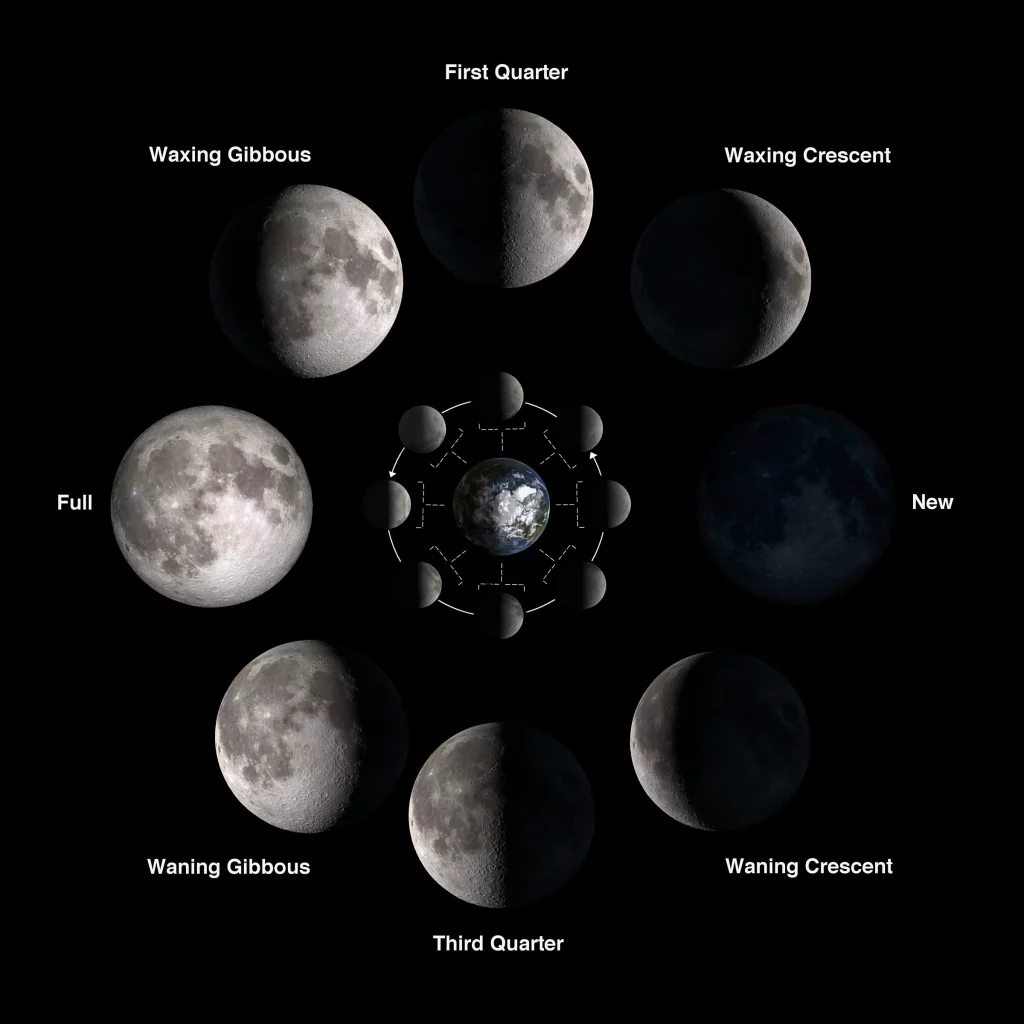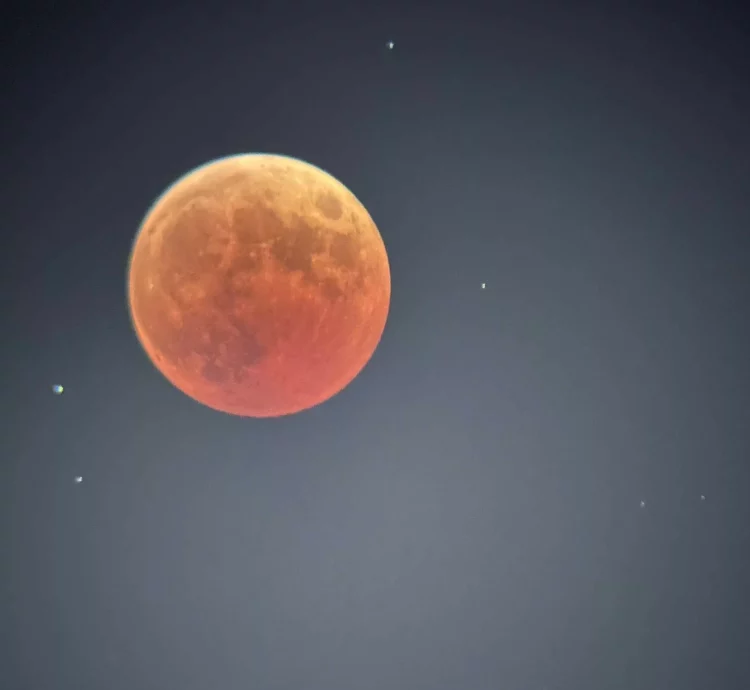The Moon, Earth’s only natural satellite, has fascinated humanity for millennia. Its phases, surface features, and influence on our planet’s tides have captured human imagination and scientific curiosity. This article delves deeply into the Moon’s physical characteristics, geological features, historical significance, exploration milestones, and its scientific importance.
I. Overview of the Moon
1. Basic Facts
- Size and Mass: The Moon has a diameter of approximately 3,474 kilometers (2,159 miles) and a mass of about 7.35 × 10^22 kilograms, which is about 0.01 times the mass of Earth. It is the fifth-largest natural satellite in the Solar System.
- Orbit and Rotation: The Moon orbits Earth at an average distance of about 384,400 kilometers (238,855 miles). Its orbit is elliptical, which means its distance from Earth varies slightly. The Moon rotates on its axis in the same time it takes to orbit Earth—about 27.3 days—resulting in the same side always facing Earth, a phenomenon known as synchronous rotation.
- Phases: The Moon goes through a cycle of phases—new moon, waxing crescent, first quarter, waxing gibbous, full moon, waning gibbous, last quarter, and waning crescent—due to its position relative to Earth and the Sun. This cycle takes approximately 29.5 days, known as a lunar month or synodic month.
2. Physical Characteristics
- Surface Composition: The Moon’s surface is covered in a layer of fine dust and rocky debris called regolith. This regolith is composed mainly of silicate minerals such as plagioclase, pyroxene, and olivine.
- Gravity: The Moon’s gravitational pull is about 1/6th that of Earth. This lower gravity affects various phenomena, including the behavior of objects and the physical characteristics of the Moon’s surface.
- Temperature: The Moon experiences extreme temperature variations between day and night. Temperatures can range from about 127 degrees Celsius (260 degrees Fahrenheit) in sunlight to approximately -173 degrees Celsius (-280 degrees Fahrenheit) in shadowed areas.
II. Geological Features
1. Surface Features
- Maria: The Moon’s surface is dotted with large, dark plains known as maria (singular: mare). These vast, basaltic plains were formed by ancient volcanic activity. Major maria include the Sea of Tranquility (Mare Tranquillitatis), the Sea of Storms (Mare Imbrium), and the Sea of Serenity (Mare Serenitatis).
- Highlands: The Moon’s highlands are brighter and heavily cratered regions that are older than the maria. These areas, known as the lunar highlands or terrae, are composed mainly of anorthosite, a type of rock rich in plagioclase feldspar.
- Craters: The Moon is covered with impact craters of various sizes, from tiny pits to large basins. Notable craters include Tycho, Copernicus, and Clavius. These craters were formed by collisions with asteroids and comets.
- Rilles: Rilles are channel-like features on the Moon’s surface, believed to be formed by ancient volcanic activity or lava flows. There are two main types: sinuous rilles (curved channels) and arcuate rilles (bowl-shaped depressions).
2. Geological Processes
- Volcanism: The Moon’s volcanic activity occurred mainly during its early history, around 3 to 4 billion years ago. The lava flows that created the maria are believed to have originated from volcanic eruptions.
- Impact Cratering: Impact cratering is a dominant geological process on the Moon. The lack of significant atmospheric protection means that the Moon has retained many of the craters that were formed throughout its history.
- Regolith Formation: The Moon’s regolith is the result of billions of years of meteoroid impacts, which grind up rocks into fine dust and soil. This process is known as space weathering.
III. Historical Significance
1. Ancient Observations
- Cultural Impact: The Moon has been a significant cultural and religious symbol throughout human history. Many ancient civilizations, including the Greeks, Romans, and Chinese, associated the Moon with deities and incorporated it into their myths and legends.
- Early Science: Ancient astronomers such as Galileo Galilei, Johannes Kepler, and Sir Isaac Newton made critical observations and studies of the Moon, laying the groundwork for modern lunar science.
2. Space Exploration
- The Space Race: The Moon became a focal point of the Cold War space race between the United States and the Soviet Union. The competition to reach and explore the Moon led to significant advancements in space technology and exploration.
- Apollo Missions: NASA’s Apollo program, which included a series of manned missions to the Moon, marked a significant achievement in space exploration. The first successful manned landing on the Moon occurred on July 20, 1969, during the Apollo 11 mission.
- Apollo 11: Astronauts Neil Armstrong and Buzz Aldrin became the first humans to walk on the Moon, while Michael Collins orbited above. Armstrong’s famous words, “That’s one small step for man, one giant leap for mankind,” were broadcast worldwide.
- Subsequent Missions: Apollo 12, 14, 15, 16, and 17 followed, each contributing to our understanding of the Moon’s surface and geological history. Apollo 15, 16, and 17 included lunar rovers that allowed astronauts to explore further from their landing sites.
- Lunar Landers and Rovers: In addition to the Apollo missions, several unmanned missions have explored the Moon, including the Soviet Luna program, which achieved the first successful impact on the Moon in 1959, and various orbiters and landers from NASA, ESA, and other space agencies.
3. Scientific Research
- Lunar Samples: The Apollo missions returned lunar samples that have been studied extensively. These samples have provided insights into the Moon’s composition, formation, and the history of its volcanic and impact activity.
- Remote Sensing: Lunar orbiters, such as NASA’s Lunar Reconnaissance Orbiter (LRO) and ESA’s Smart-1, have provided detailed maps of the Moon’s surface, identifying key geological features and helping to select future landing sites.

IV. Scientific Importance
1. Understanding the Moon’s Formation
- Giant Impact Hypothesis: The leading theory for the Moon’s formation is the giant impact hypothesis. This theory suggests that the Moon formed from the debris ejected when a Mars-sized body collided with the early Earth about 4.5 billion years ago.
- Differentiation: The Moon’s composition and lack of volatile elements support the idea that it formed from material that was vaporized and then re-condensed. This process also explains the Moon’s lack of a significant atmosphere and magnetic field.
2. Lunar Geology and Surface Processes
- Comparative Planetology: Studying the Moon provides valuable information about the early Solar System and planetary formation. The Moon’s surface has preserved a record of impact events and volcanic activity that can be compared with other celestial bodies.
- Future Exploration: Understanding the Moon’s geology is crucial for future exploration missions, including potential lunar bases and resource utilization. The Moon’s regolith contains valuable resources such as helium-3, which could be used in future fusion energy research.
3. Influence on Earth
- Tidal Forces: The Moon’s gravitational pull creates tides in Earth’s oceans. This interaction influences marine ecosystems and has been a significant factor in the evolution of life on Earth.
- Stabilizing Earth’s Axis: The Moon plays a role in stabilizing Earth’s axial tilt, which affects our planet’s climate and seasonal variations. Without the Moon’s gravitational influence, Earth’s tilt could vary more dramatically, leading to extreme climate fluctuations.
V. Future Exploration and Missions
1. Planned Missions
- Artemis Program: NASA’s Artemis program aims to return humans to the Moon and establish a sustainable presence. The program includes the Artemis I mission, an uncrewed test flight of the Space Launch System (SLS) and Orion spacecraft, followed by crewed missions to explore the lunar surface and establish a lunar gateway.
- International Collaboration: Other space agencies, including the European Space Agency (ESA), Roscosmos (Russia), and the China National Space Administration (CNSA), have plans for lunar exploration. China’s Chang’e program has already achieved several significant milestones, including landing on the far side of the Moon with Chang’e 4.
- Commercial Ventures: Private companies, such as SpaceX and Blue Origin, are also developing technologies for lunar exploration and potential commercialization. These ventures may contribute to future lunar missions and the establishment of a permanent lunar base.
2. Long-Term Goals
- Lunar Base: One of the long-term goals of lunar exploration is to establish a permanent base on the Moon. Such a base would serve as a platform for scientific research, resource extraction, and a stepping stone for further space exploration.
- Resource Utilization: The Moon’s resources, including water ice found at the poles and rare minerals in the regolith, could be used to support future missions and sustain











































Discussion about this post